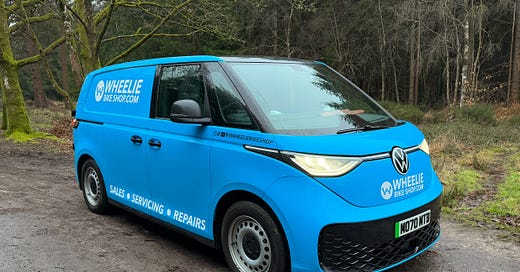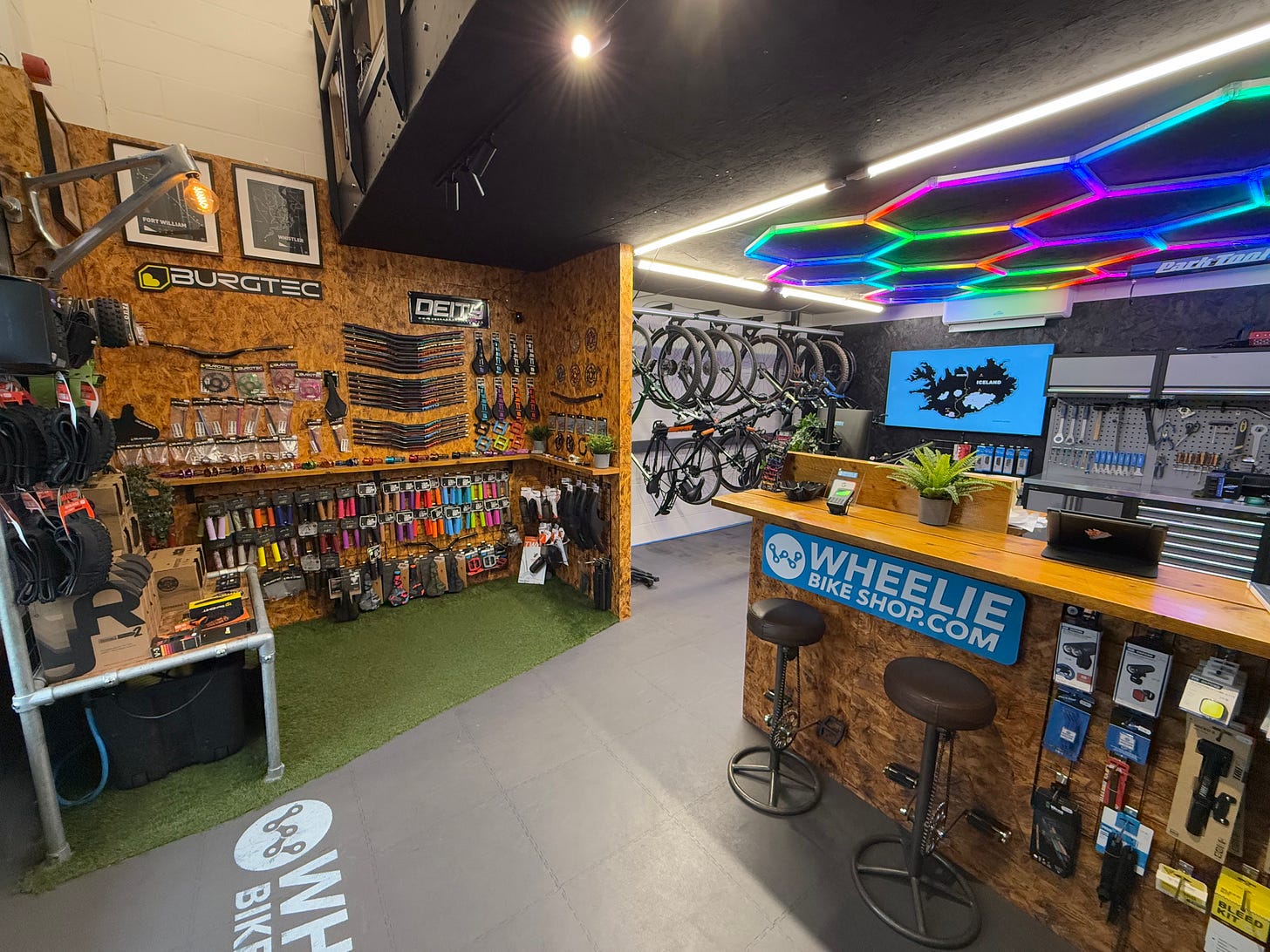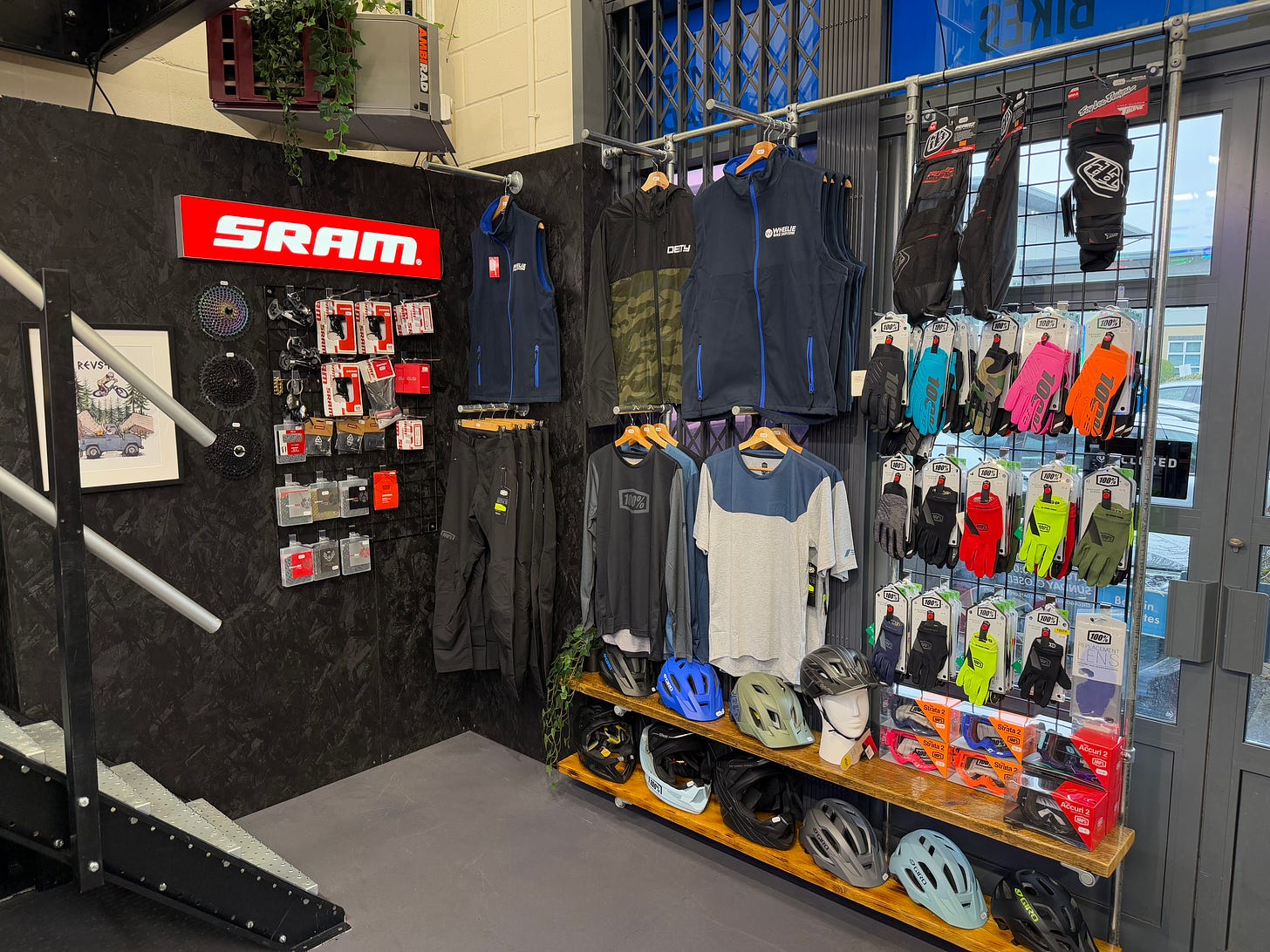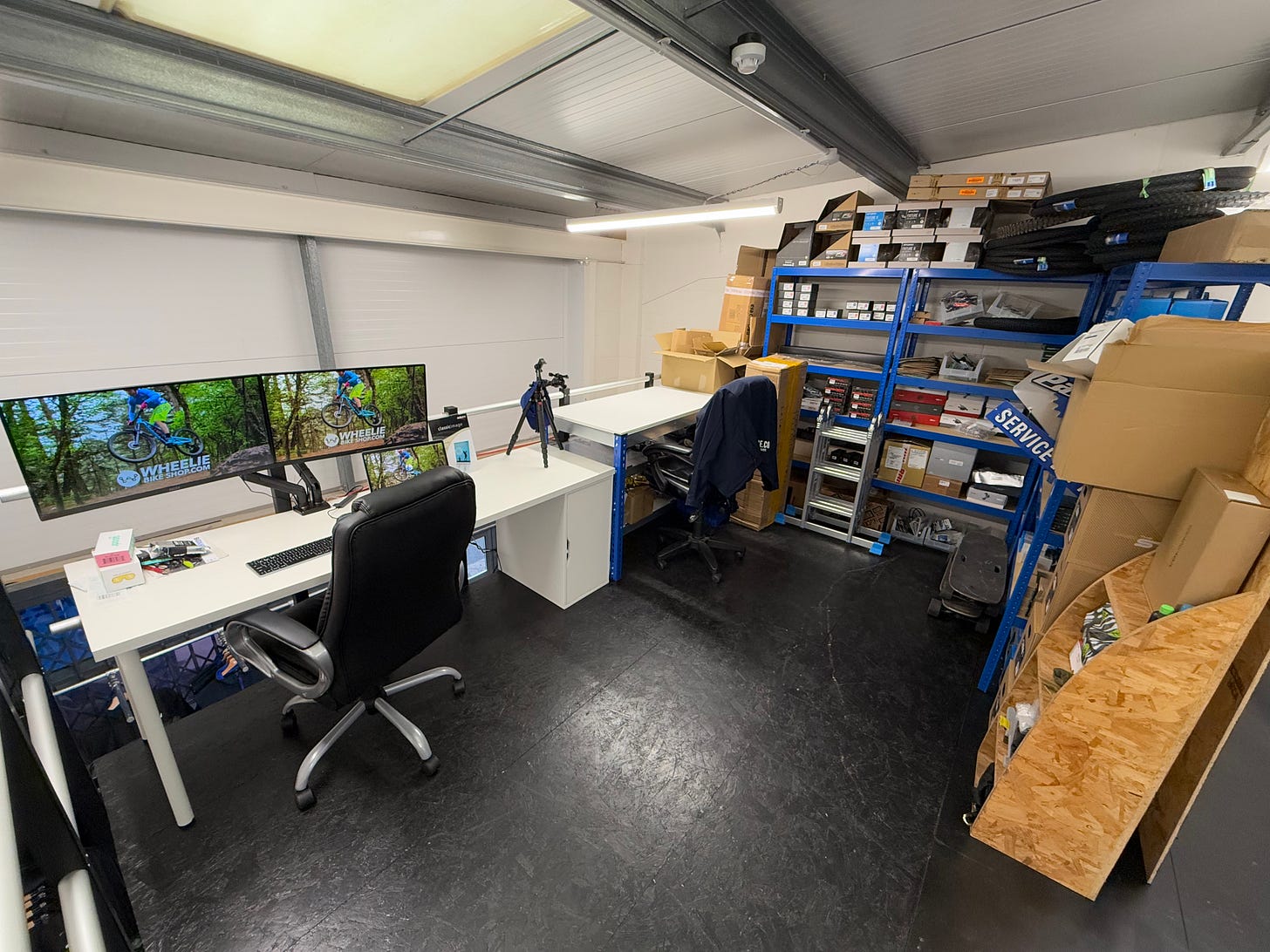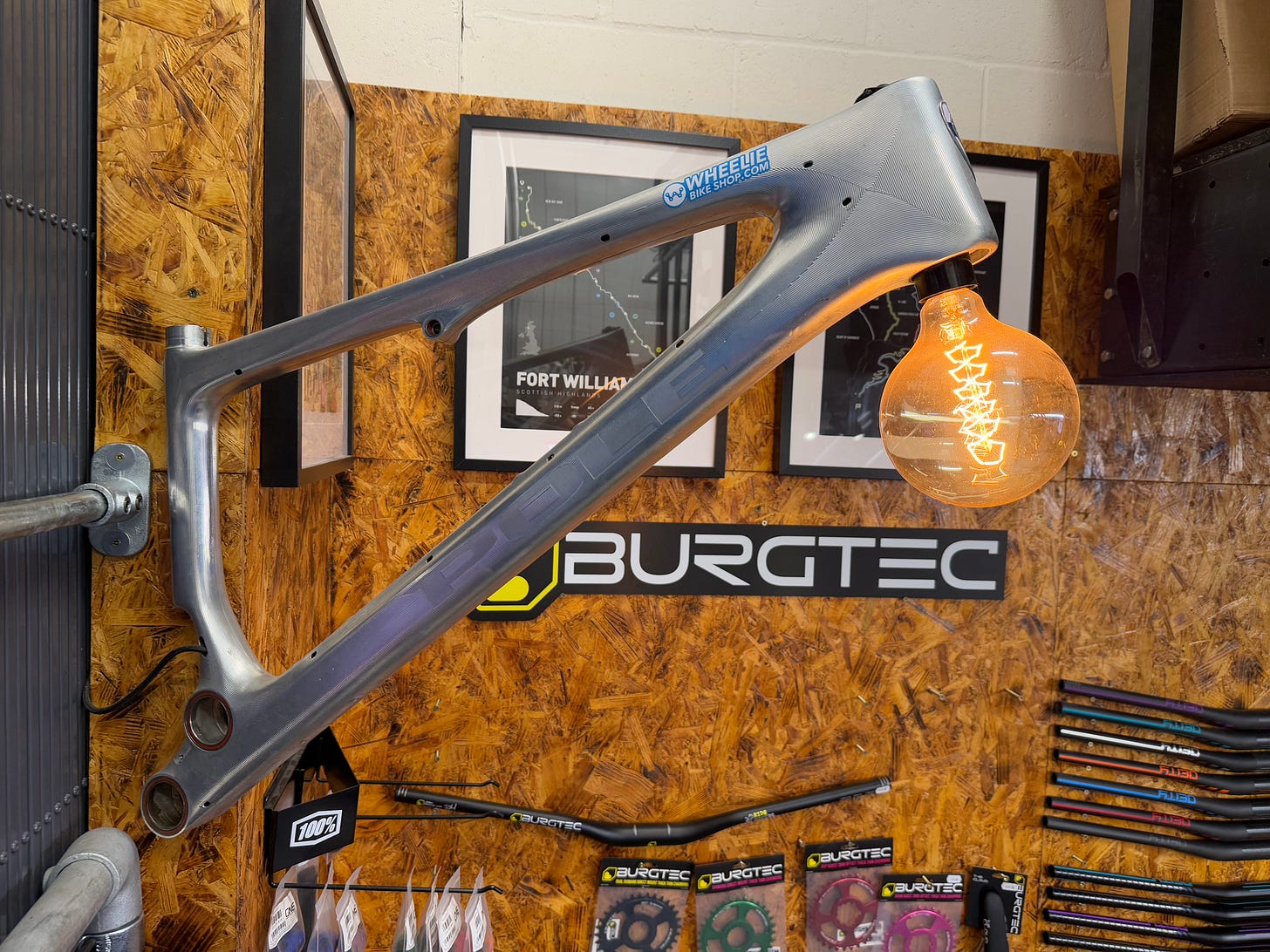Being Wheelie Creative
Our inaugural Third Thursday post looks at an independent bike dealer specialising in workshop services and asks, 'What does it take?'
The UK bike industry has been on a wild ride since the Covid years, when a pandemic-fuelled pedal power boom saw bikes flying out of shops faster than supply chains could keep up. Those golden days of empty bike racks and endless waiting lists have given way to a more sobering landscape. Demand has cooled, inventory has piled up, and many retailers both large and small have found themselves unable to keep their wheels turning.
In the midst of this, though, we are aware of at least one independent bike dealer (IBD) that has found a way to navigate along the rocky trail and seems to be building a sustainable business. In this post we’ll take a look at how some of the principles of sustainability—and the skills involved—have been applied to make that happen.
We first wrote about Wheelie Bike Shop (‘Wheelie’) in a Green Edge post in August 2022. At that time, Wheelie and its owner, Michael Maiden, had been operational in a small unit of the Arena Business Centre in Poole, Dorset, for around 18 months. Michael, who at the ripe old age of 19 had leveraged a small family and friends investment to move into Arena during the third national lockdown in 2021 so that he could expand his online bike parts business, was in the process of getting to grips with how he could move Wheelie forward, at a time when the bottom was beginning to drop out of the national bike market.
Bike servicing—a natural extension of what Michael had been doing during his schooldays to fund his passion for downhill racing—remained a good little side hustle. As we wrote at the time…
Micro workshops, often starting with a single bike enthusiast working out of a home garage, can be locally successful, although access to premium spares via trade accounts with the big suppliers and distributors like ZyroFisher, Madison and Hope often depends on setting up more commercially-recognisable bricks-and-mortar premises.
The Green Edge, ‘Zen and the New Art of e-Bike Maintenance’, August 2022
With his new bricks-and-mortar premises, Michael had got the trade accounts he needed with the big suppliers, and the online (plus, increasingly, in-store) sales of handlebars, shocks, brakes, drive train components and the like had paid dividends (metaphorically, at least). But by mid-2022 that particular business stream was on a downward trajectory, and he was experimenting with other ventures such as whole-bike sales. With hindsight, that wasn’t the best way to go at that particular time, with some major suppliers going down, along with some of the local competition. Overproduction and slumps in demand, undersupply and changing business relationships, and the onward march of micro-mobility options were all blamed, in full or part, for the failures.
But, sensing the market, listening to customers and learning all the time, towards the end of 2023 a decision was made to ‘go large’ with servicing. Michael told us recently, “As you can't get your bike fixed on the Internet, that's what we decided to do, really specialising in the servicing and making it our main focus.”
Specialising on servicing didn’t just mean being good at the spanner-in-hand stuff—after all, Michael and the small team of young enthusiasts crystallising around him were already pretty nifty with all that. It also meant building a vibe around the servicing, one which bikers—many of whom love a bit of buzz—could hook into, identify with and, ultimately, think of Wheelie as a cool place to get their bikes sorted out.
Image: WBS
Implementing a slick electronic workshop management system was a great first step, enabling bikers to book in their machines online and then track them through the service, throwing out optics of the work-in-progress and advising any potential onward costs in real time. Another is the canny use of social media—daily reels going out to TikTok, Instagram et al showing before-and-after walkrounds of bikes going through the workshop, along with unboxing of new shipments and other things that appeal to the online bike community.
Perhaps the main selling point, though, was the workshop itself. Already having a quirky look to it in 2022 and reflecting Michael’s original concept of Wheelie as a place for young bikers to hang out, when we last saw it a few weeks ago the workshop could almost be described as boutique, with mood lighting, colourful displays and a big screen looping the latest YouTubes of two-wheeled events of the non-motorised kind. Michael tells us: “All the sales reps I talk to say [bike shops like Wheelie] which have got a vibe and energy, with good personal service and use of social media, they're the ones that are doing well. The ones that don't, the frame shifters and older style workshops, have more of a problem.”
Michael goes on to tell us that this all helps the bottom line: “We have very nice displays in the shop with lots of kind of cool coloured parts. A lot of people are tempted by it, so a small service often ends up being a lot more.”
Image: WBS
Now, all this is a good story in and of itself. But can we take it a step further and examine how skills for sustainability have been applied to steer Wheelie’s path through tricky times for the bike sector? Beyond that, to what extent can a business like Wheelie be described as a truly sustainable business?
In terms of skills, our first port of call might be GreenComp, the EU’s sustainability competence framework. Well thought-out, we’re sure; but the problem is that all the words and concepts—in GreenComp as well as some of the other green frameworks we see—can at times seem a little abstract. And, specifically in the case of GreenComp, its dumbed-down visual representation, with bees flying around flowers and blobs of what we can only assume is pollen, floating along with phrases like problem framing and (of course) system thinking, can all seem a little condescending and, perhaps to some folks, rather silly.
The real question is: how does a competence framework like GreenComp apply in the real world? Well, with the usual caveats on how much we should trust AI, we went to ChatGPT and asked the question about how GreenComp might apply to a business like Wheelie. This was its stab at the probabilistic truth…
For a small independent bike shop in the UK, the competences outlined in GreenComp—like systems thinking, innovation, and sustainability values—can provide a sturdy framework for staying resilient and thriving in a changing market. Systems thinking could help the shop see itself as part of a larger ecosystem: sourcing bikes and parts from sustainable suppliers, collaborating with local cycling groups, and advocating for better cycling infrastructure. Innovation might mean branching into e-bike servicing or offering repair workshops to tap into the growing DIY culture. Embracing sustainability values could involve promoting refurbished bikes, running trade-in schemes, or hosting events to champion greener transport. By embedding these competences into their day-to-day operations, the shop not only supports its community but also builds a loyal customer base that values ethical, forward-thinking businesses.
Source: ChatGPT in response to the question ‘For a small independent bike shop in the UK, how would you say the competences described in GreenComp could be applied to ensure a sustainable business?’
True or no? Well, to test what ChatGPT told us, we talked to Michael. And it turns out that since 2022 he has indeed taken steps towards a few of these things. He’s certainly building Wheelie into the biking ecosystem: offering coaching, supporting groups like Dorset Rough Riders and building a race team sponsoring young local talent. Meanwhile, e-bike servicing now makes up a significant proportion of Wheelie’s overall business, which incidentally has required considerable investment in both money and time to gain certifications to work on motors from suppliers like Bosch. Refurbishing bikes—yes, although as Michael says: “Right now, the second-hand bike market is catastrophically bad, because you can buy a new bike so cheap. No one buys second hand, lots of them end up at the dump.” But there’s always a chance to resell a high-quality pre-owned bike if an equally high-quality refurb job has been done on it, which is where Michael concentrates his efforts.
But in our opinion, the foremost ‘green’ skill that has been used to steer Wheelie to where it is today is creativity—more of a ‘soft’ skill perhaps, but one which regularly weaves its way into green skill narratives from the likes of UNIDO and The Design Council.
Why so? Several reasons, but none more so than in the creative use of space. Consider: how does a business pivot from being an online seller to a boutique workshop, essentially moving a warehouse to a functional operations line, without business interruption and within the same (actually quite small) physical space? This is a non-trivial task, and Michael tells us that while he has considered moving to larger premises several times during the past three years, thinking critically through the options (another ‘green’ skill) convinced him each time to stay put, reconfigure (more than once) and make the best use of the space available.
So far, it’s worked, and this is reflected in the company’s annual numbers. In 2021, the company broke even on high online sales revenue. In 2022, reflecting the dip in the online market, it made a small loss on a reduced top line. Now, two years later, while revenue—now largely coming from the workshop—is almost back up to 2021levels, margin is—well, the exact number isn’t released yet, but let’s just say it’s looking comfortable.
Still more changes are afoot for 2025. Bolstered by renewed interest in e-bikes, the online aftersales market looks like it’s taking an upturn. Bringing clean warehouse space back into the workshop environment? More creativity needed—this time the answer seems to be to start building upwards.
Image: WBS
So, is Wheelie, and other businesses like it, sustainable? Again, let’s take a cautious dip into ChatGPT to get its opinion:
A small independent bike shop can weave the principles of people, planet, and profit (the 3P's) into its business model to ensure long-term sustainability. People come first—building strong relationships with customers by offering excellent service, organising community rides, and supporting local cycling initiatives. By fostering a sense of belonging, the shop can create loyal advocates who keep coming back. Planet can be championed through eco-friendly practices, like stocking sustainable products, recycling old bike parts, and encouraging repairs over replacements to extend product lifecycles. Lastly, Profit isn’t just about sales but creating a steady, diversified income stream—offering services like e-bike maintenance, running repair workshops, or even renting bikes. By balancing these three principles, the shop can pedal toward a future that’s as sustainable as it is successful.
Source: ChatGPT in response to the question: ‘How might a small independent bike shop apply the principles of people, planet and profit (3P's) to its quest to maintain itself as a sustainable business?’
People? Yes, we’re pretty sure Wheelie can tick that box. Profit? That also seems to be running ok for now, and Michael has his nose to the wind for diversifying the income streams—incidentally, a partnership with a local leisure business also brought bike rentals into the Wheelie portfolio during 2024.
And Planet? Looking through the websites of some of Wheelie’s main suppliers, we don’t see much evidence of sustainability strategies, although some brands like Muc-Off and Michelin do seem to be making rumblings in the right direction. Perhaps the others feel that biking as an inherently ‘green’ sector is enough. But as for Wheelie itself, there’s the recent investment in an electric VW ID. Buzz as its primary transport—plus, the workshop shows some nice touches of the Circular Economy in action. We like that.
Image: WBS

